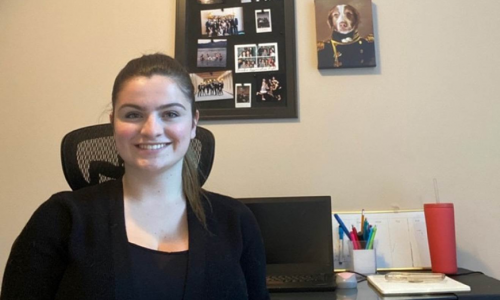
The Beginning
As a student starting a full-time job in a professional setting for the first time, I honestly didn’t know what to expect. It never occurred to me that I was about to take the first step into my professional career with the government, of all places. I’ve always heard good things about working for the Canadian government. The people are friendly and cooperative, job security is second to none, and the benefits they offer aren’t too shabby. It turns out everything was exactly as I had heard it, but almost nothing turned out as I had expected. My initial perception of a government job was extremely bureaucratic, structured, and static. In reality, the job had the bureaucratic foundation that I had expected, but it was surprisingly dynamic and often changing.
One example of something that was completely unexpected was the interview process. A month before I had applied for the Canada Revenue Agency (CRA), I had an interview with the U.S. Consulate. During the interview there, I had to clear several security measures and ended up handing over my personal belongings at the security window before I could talk to the employer directly for the interview. As for the CRA interview, it was a standard phone interview facilitated by an SFU co-op coordinator. Afterwards, I would have to make a brief visit to the workplace, sign several documents, and wait until they performed their security and criminal record check. I have to admit it was one of the least nerve-wracking interview experiences I’ve ever gone through.
Through the first week at the job, the training staff introduced us to all the managers and key individuals at our call site, while also acclimating us to the culture and expectations they have at the CRA. Did I mention there were almost 40 of us SFU co-op students at the time? Well they had to split us up into two training classes, where each and every one of us would participate in a six-week tax training course before they could make us “go live”, as they like to call it. For the next month and a half, it felt like I had never left school. Our two training facilitators taught the class all the basics and intricacies that come into filing a standard Canadian tax return. We would have the chance to answer questions and also learn at our own pace through online modules. Throughout the course, we would learn countless procedures and how to operate the numerous systems that are required when interacting with our clients.
The Work
When it was time for all the students to go live, we would supposedly all have the sufficient knowledge and skills in place to assist taxpayers with. For the first 3 weeks on the phones, all the co-ops were in one large team before we were distributed into our respective teams later in the term. I felt relatively confident compared to my peers when I first went live, likely because my expectations were completely and utterly mistaken. I expected people to call in with specific tax questions or requests, so that I could answer their enquiry or process their request accordingly. But I never expected people to take the “General” in “General Income Tax Enquiries” so literally. Taxpayers could be calling in asking for a telephone number for another government agency or simply to rant about our country’s tax system. But one of the things we must do as a CRA employee is to make our best effort to assist the taxpayer that calls in to our number. In other instances, taxpayers would call in with very elaborate and unique situations in which I had trouble finding the answer to. Fortunately, if I were to encounter any of these difficult calls, I could always refer to our resource officers who are experienced and knowledgeable in almost any tax-related topic.
I thoroughly enjoyed the first few weeks on the phones because it was surprisingly challenging and required a lot of on-the-job learning. I realized after the second week that I couldn’t rely solely on what we learned during the training course and that in some situations, experience is the best teacher. After the first 3 weeks of trying to get the general feel of the job, we were assigned to our respective teams at the call site. We met our new supervisor and colleagues who we would work with for the remainder of the term at the CRA. I spent the next several months leading up to the new year learning ways to assist taxpayers more effectively and efficiently, either from personal experience or advice from the more experienced call site employees.
The End
By the time 2012 had arrived, the job was already starting to become more familiar and the comfort level had definitely increased in my work. My answers were becoming more confident and finding solutions to questions became simpler by the day. Days after the job started to feel more mundane, they required us to participate in a 2012 highlights and changes course, which would last around 3 days. The purpose of the course was to inform us of any changes in the 2011 tax return, which taxpayers would have to file in the upcoming months of February to April. The course also offered us plenty of time for review and clarification of numerous other topics. After a few days off the phones, it was back to work.
At this point of the work term, there wasn’t much else to expect other than the increased volume of calls during filing season. And as it rolled into mid-February, the floodgates opened and the calls started pouring in day by day. Fortunately, the volume of calls was not directly correlated to the difficulty of the calls, it was rather the opposite. This was mostly due to the fact that more tax professionals and accountants were calling in for their clients and have had previous experience with Canadian taxes, making for easier and more streamlined calls. If normal taxpayers were calling in at this time, the majority would be asking about the status of their return, which are also simple and brief calls.
I can’t say I learned a lot from the last stretch of the term here at the CRA, which is expectedly so. But it is quite obvious to me that throughout the whole term, I have learned a number of valuable lessons and developed friendships and relationships with people I would’ve never had the chance to if I hadn’t worked at the call site. Working as a call centre agent gave me the opportunity to learn more about the real world and its realities. Listening to the harsh living conditions of the less fortunate here in Canada and stories of people trying to get their life back in order helped me put a lot of things into perspective. Honestly, I did not expect to learn these many life lessons in such a short period just by picking up the phone and talking to taxpayers. Just another perfect example of how unexpected life can be.















